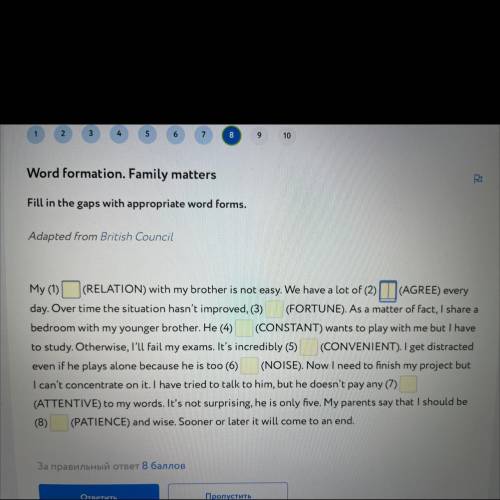Word formation. Family matters Fill in the gaps with appropriate word forms.
Adapted from British Council
My (1) (RELATION) with my brother is not easy. We have a lot of (2)| (AGREE) every
day. Over time the situation hasn't improved, (3) (FORTUNE). As a matter of fact, I share a
bedroom with my younger brother. He (4) (CONSTANT) wants to play with me but I have
to study. Otherwise, I'll fail my exams. It's incredibly (5) (CONVENIENT). I get distracted
even if he plays alone because he is too (6) (NOISE). Now I need to finish my project but
I can't concentrate on it. I have tried to talk to him, but he doesn't pay any (7)
(ATTENTIVE) to my words. It's not surprising, he is only five. My parents say that I should be
(8) (PATIENCE) and wise. Sooner or later it will come to an end.

Другие вопросы по теме Английский язык
Популярные вопросы
- Что видит мцыри из стен монастыря( какую родину он видит)?...
2 - Какое проверочное слово к слову жестяной?...
1 - Придумайте 6 вопросов по рассказу щелкунчик и мышиный король....
3 - Напишите реакции: 1) хлорида железа 3 и гидроксида натрия 2) гидроксида...
3 - При сжигании 84 г резины, содержащей 97% бутадиенового каучука и 3%...
2 - Решите логическую методом таблиц, с решением. на уроке физкультуры...
3 - Синтаксический разбор предожения -дорога,как змеиный хвост,полна народу,шевелится....
2 - Для полива одной грядки огурцов нужно 3 ведра воды.сколько грядок...
2 - Какие слова можно составить из слова удовольствие?...
3 - Кто главный герой поэмы женщины?...
1
2) Disagreements
3) Unfortunately
4) Constantly
5) Inconvenient
6) Noisy
7) Attention
8) Patient
In this text, we are talking about the relationship between the speaker and their younger brother. The speaker mentions that their relationship is not easy and they have disagreements every day. The situation has not improved over time. The speaker shares a bedroom with their younger brother, who constantly wants to play with them. However, the speaker needs to study to avoid failing their exams. The situation becomes even more inconvenient because the younger brother is noisy, and the speaker gets distracted even when the younger brother plays alone.
The speaker has tried talking to their brother about this issue, but the brother does not pay attention to their words. This is not surprising since the brother is only five years old. The speaker's parents advise them to be patient and wise because sooner or later, the situation will come to an end.
To fill in the gaps with the appropriate word forms, we need to consider the context and choose words that fit grammatically and convey the intended meaning. For example, when talking about the relationship between the speaker and their brother, we use the word "relationship" as a noun, so we fill in the gap with "relationship" in its adjective form, "relationship". Similarly, we use the word "disagreement" as a noun, so we fill in the gap with its plural form, "disagreements".
In addition to fitting the grammar, the chosen words should also match the meaning conveyed in the context. For example, the speaker mentions that their younger brother constantly wants to play with them, so we fill in the gap with the adverb form of "constant," which is "constantly." This choice accurately reflects the fact that the brother's desire to play is ongoing and persistent.
Overall, filling in the gaps with appropriate word forms requires an understanding of grammar rules, the context of the text, and the intended meaning. By carefully analyzing the text and considering these factors, we can successfully complete the exercise and express the ideas effectively.